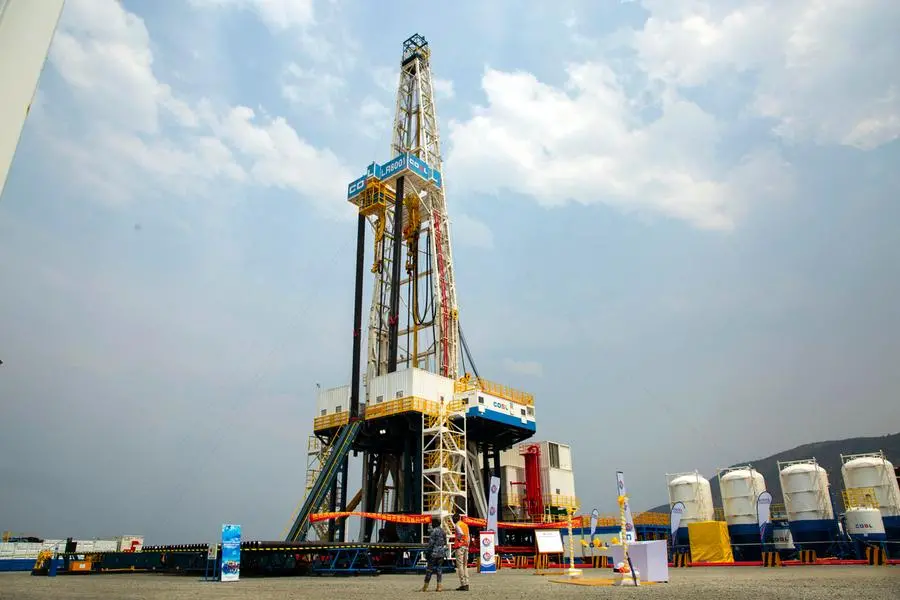PHOTO
Uganda’s Cabinet this week approved the financing structure for the country’s $4 billion oil refinery, opting to fund the facility entirely through equity, as the government and private-sector partner Alpha MBM Investments Llc pivot from seeking project finance in the international financial markets.
Energy Minister Ruth Nankabirwa announced on Tuesday during the two-day Uganda International Oil and Gas Summit in Kampala, that United Arab Emirates (UAE)-based Alpha MBM Group would commit funds for the project over three years.“Those who have money no longer want to finance oil projects. We have to do it ourselves,” she said, alluding to the challenges that Uganda and its joint venture partners, TotalEnergies and China National Offshore Oil Corporation, have faced raising debt financing for the East African Crude Oil Pipeline.
European and American banks are shying away from supporting fossil fuel projects.
Speaking at the same event, Dr Michael Nkambo Mugerwa, General Manager of Uganda Refinery Holding Company, a wholly government-owned subsidiary of Uganda National Oil Company (Unoc), explained the reasons behind this decision.
“We started that journey by looking for capital from the international financial markets back in 2018, and we did not succeed. We are not looking for project finance for this project. Government is committing 40 percent and our partner from the UAE is committing 60 percent,” he said.
In 2018, the government signed the project framework agreement with a group of American and Italian firms, the Albertine Graben Refinery Consortium (Agec), to seek financing and develop the refinery, but the group’s deal expired in June 2023 without reaching key project milestones.
In a statement this year, the Energy ministry said these milestones included getting commitment letters from lenders, who would provide 100 percent of the required debt before the final investment decision (FID) for the project could be taken -- which Agec failed to do.
The government also said the consortium failed to obtain signed commitment letters from equity investors, an environmental and social impact assessment for the refinery, submit a lumpsum turnkey price for the project, execute a commercial viability assessment, and procurement of a financial adviser.
After the expiry of the PFA, the government announced that it was ditching private companies and was now seeking publicly owned companies to partner with on the refinery.
But in January 2024, the minister announced the signing of a memorandum of understanding with the Alpha Group.
Even when the PFA was still in place, Unoc, in March 2023, signed several deals with Sonatrach, an Algerian government-owned company with expertise in the oil and gas value chain, which industry analysts interpreted as a signal that the North African petroleum giant would replace Agec. But this did not happen.
Unoc spokesperson Tony Otoa declined to comment on Uganda’s U-turn that handed the refinery job to the Dubai-based Alpha MBM, a private company and investment outfit led by Sheikh Mohammed bin Maktoum bin Juma Al Maktoum, a member of the Dubai royal family.
Dr Mugerwa said macroeconomics studies on the refinery done with Stanbic Bank and reviewed by the Ministry of Finance, Bank of Uganda, and the National Planning Authority, show the project, to be based at Kabaale in Hoima District, will have a direct GDP contribution of about $3.4 billion per annum.“When we add Kabaale Industrial Park, in which the refinery will sit, you are talking another $4.9 billion – $5 billion of GDP contribution,” he said, adding that overall with indirect benefits, “we are looking at $8 billion, which is 20-25 percent of our current economy.”Energy economists say the 60,000 barrels-per-day refinery makes sense for Uganda’s growing demand for refined oil products, noting that the country currently consumes 7 million litres per day, but with demand growing in the 8-12 percent range, the expectation is that it will double by 2025 and possibly triple it by 2040.
Unoc is mandated to buy from the upstream operators all the 60,000 bpd that the refinery requires to refine for the local and regional markets.
© Copyright 2022 Nation Media Group. All Rights Reserved. Provided by SyndiGate Media Inc. (Syndigate.info).




















